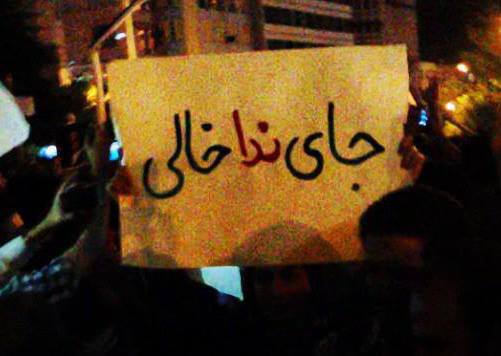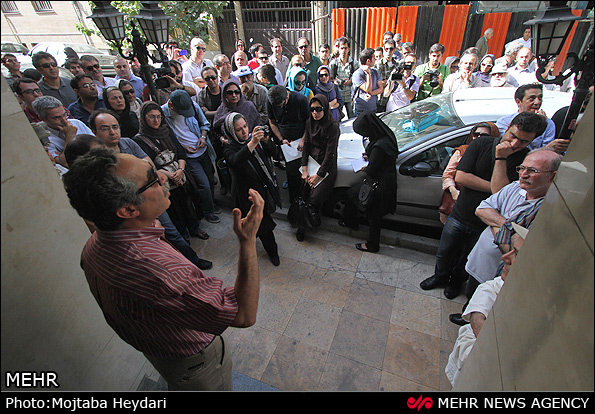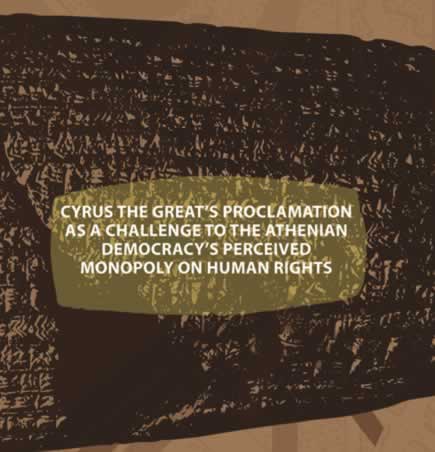
Iran Elections: Celebration Now, A Long and Unpredictable Path Ahead
June 16, 2013
House of Cinema Attacked
July 18, 2013Arseh Sevom — Is Europe the “unique source” of human rights and individual rights, as some scholars claim? Was fifth century Athenian democracy the origin of political equality (as long as you weren’t a slave)?
Hirad Abtahi, first legal adviser of the Presidency of the International Criminal Court, took these questions as his challenge when writing his book, Reflections on the Ambiguous Universality of Human Rights [pdf], published by Arseh Sevom. He writes:
“Athenian Democracy should be viewed as only one component of a general egalitarian aspiration within the ancient world.” (p. 14)
Abtahi focuses on the impact of the proclamation of Cyrus the Great, which predates Athenian democracy by centuries and which is partially preserved on the Cyrus Cylinder. In it, he identifies three main themes: dialogue, tolerance, and peace. He uses the text of the proclamation along with testimony of contemporary historians and commenters, including the Hebrew Bible, to document the impact of the rule of Cyrus the Great and his attitude towards the diverse people who made up the Persian empire. Abtahi also locates many concepts that would later become integral to the Universal Declaration of Human Rights (UDHR). While it isn’t a theoretical document, he wrtes that
“…through the third part of the Proclamation it is possible to identify theoretical principles which foreshadow the core principles of present day human rights, that is freedom of thought, conscience, and religion (A), protection of civilians (B), protection of property ( C ), and more generally, the idea of peace (D). (p. 30)
It seems that the proclamation wasn’t merely pretty words. While other conquerors were boasting of the cruelty they showed the people they vanquished, subscribing to the idea that only brutality would bring about obedience, Cyrus the Great was bragging about his peaceful occupation of Babylon. The proclamation states:
“As for the citizens of Bablyon…whom (Nabonidus) had made subservient in a manner (totally) unsuited to them against the will of the gods, I released them from their weariness and loosened their burden.”
Later the proclamation states that he “took great care to peacefully (protect) the city of Bablyon and its cult places.”
Finally, we’ll give the philosopher Plato the last word. He wrote that:
“the Persians, under Cyrus, maintained the due balance between slavery and freedom, they became, first of all, free themselves, and, after that, masters of many others. For when the rulers gave a share of freedom to their subjects and advanced them to a position of equality, the soldiers were more friendly towards their officers… and if there was any wise man amongst them, able to give counsel, – since the king was not jealous but allowed free speech and respected those who could help at all by their counsel, such a man had the opportunity of contributing to the common stock the fruit of his wisdom. Consequently, at that time all their affairs made progress, owing to their freedom, friendliness and mutual interchange of reason.” (p. 56)
REFLECTIONS ON THE AMBIGUOUS UNIVERSALITY OF HUMAN RIGHTS: CYRUS THE GREAT’S PROCLAMATION AS A CHALLENGE TO THE ATHENIAN DEMOCRACY’S PERCEIVED MONOPOLY ON HUMAN RIGHTS, (in Persian and English), by Hirad Abtahi and published by Arseh Sevom, is being distributed by Pegah Distribution. You can email them for information on how to buy a copy: http://www.pegahfarsibook.com/contact.php





